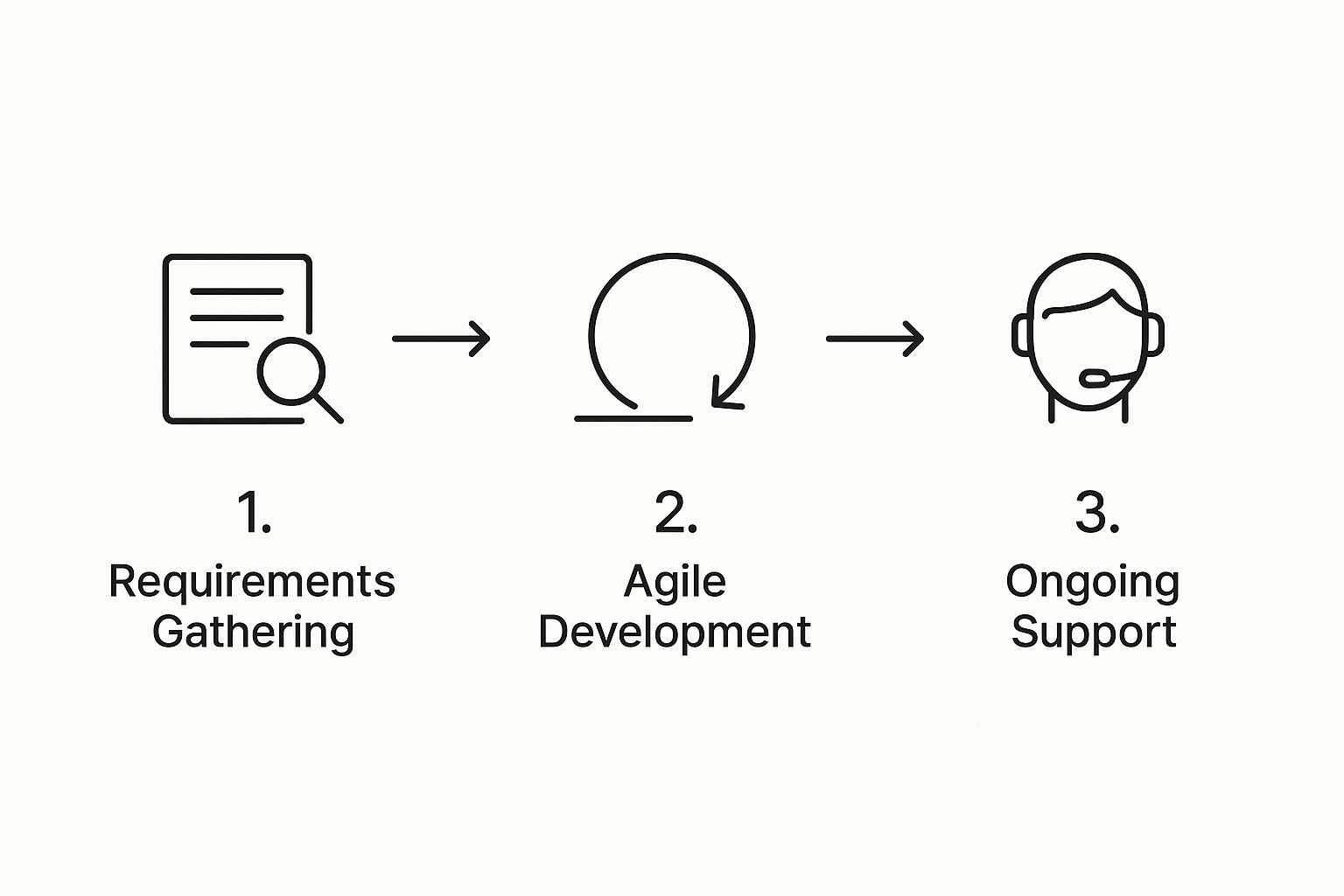Custom software development involves the design, creation, and ongoing maintenance of applications engineered specifically for a company's unique operational needs. This stands in stark contrast to off-the-shelf software, which provides a generic, one-size-fits-all solution designed for a mass market.
Investing in a bespoke solution means you gain a digital tool built with precision, perfectly aligned with your processes.
Why Smart Businesses Invest in Custom Software
Many businesses begin their journey using pre-packaged, off-the-shelf software. It's akin to leasing a generic workshop; it has the fundamental tools and functions adequately for a time. However, as operations scale and become more specialized, its limitations become apparent. The tools aren't quite right, and teams find themselves dedicating valuable time to navigating inefficient layouts and workarounds.
This is the point where a strategic pivot occurs. Forward-thinking companies recognize that to achieve a true competitive edge, they need a workshop custom-built for their needs. Custom software development services are the digital equivalent of architecting that perfect workshop. Every tool, process, and workflow is positioned with precision, enabling your team to operate more efficiently, minimize errors, and deliver superior results. The focus shifts from forcing your business to adapt to the software to engineering the software to perfectly fit your business.
This transition from a generic tool to a strategic asset is a foundational investment in your company's competitive advantage and operational excellence. It ceases to be a mere IT expense and becomes a core driver of growth and efficiency.
Aligning Software with Your Business DNA
Every company possesses a unique operational fingerprint, evident in its internal workflows, customer service approach, and long-term strategic objectives. Off-the-shelf solutions, by their very design, compel conformity to a standardized model. This can inadvertently stifle the very attributes that differentiate your business and give you a competitive advantage.
Bespoke software, conversely, is engineered to mirror and enhance your specific business DNA.
- Unique Business Processes: Your software can automate your exact workflow, not a generic approximation. This eliminates cumbersome manual workarounds and drives significant productivity gains.
- Competitive Strategy: If your advantage lies in superior customer personalization or a unique service delivery model, custom software can be architected to execute that strategy flawlessly.
- Future Growth Goals: A custom solution is designed with scalability as a core principle. It evolves with your business, adapting to new markets, services, or increased user loads without demanding a complete and costly overhaul.
Custom vs Off-the-Shelf Software at a Glance
To make the distinction exceptionally clear, it is instructive to compare the two approaches side-by-side. One involves adapting a pre-built tool, while the other focuses on creating the ideal tool from the ground up.
Ultimately, the choice hinges on whether you view software as a simple operational cost or as a strategic investment in your future.
A Proven Driver of Profitability in the UK
This strategic shift towards tailor-made digital solutions is not merely a trend; it is a proven strategy for achieving financial success. A recent survey reflecting the UK business landscape revealed that 70% of companies expect higher turnover, with nearly 75% anticipating profitability increases directly attributable to the adoption of custom software.
These organizations leverage bespoke solutions to automate complex tasks, enhance operational efficiency, and deliver personalized customer experiences that generic software cannot replicate. You can explore more about how UK firms are succeeding with custom software development.
The Real Business Value Of Tailored Solutions

While the concept of software built exclusively for your business is appealing, the true power of custom software development services is measured by their direct impact on the bottom line. It's about moving beyond buzzwords to examine the concrete, measurable advantages that generic software simply cannot provide.
These solutions are not just about personal preference; they are about unlocking new tiers of performance and constructing a robust foundation for future growth. This value is realized through enhanced efficiency, intelligent scalability, and long-term financial viability.
Consider a custom solution a force multiplier for your operations. It is designed to amplify your existing strengths and rectify operational weaknesses, giving you a competitive advantage that is difficult for others to replicate.
Gaining Unmatched Operational Efficiency
Generic software forces your team to adapt its processes to a rigid structure. Custom software does the exact opposite; it is architected around your ideal workflow, automating tedious tasks and streamlining complex operations. The result is a dramatic increase in productivity and a reduction in operational friction.
Consider a UK-based logistics company. Instead of a standard mapping tool, they commission a custom application that optimizes delivery routes in real-time. This system analyzes local traffic, delivery windows, and vehicle capacity to generate the most efficient schedule. The outcome? Significant fuel savings, faster delivery times, and markedly higher customer satisfaction.
Building For Future-Proof Scalability
One of the greatest challenges for a growing business is outgrowing its software. The off-the-shelf tool that was ideal for a small team can rapidly become a bottleneck, leading to system slowdowns, crashes, and a disruptive migration to a new platform. This reactive cycle interrupts business continuity and consumes valuable resources.
Custom software, in contrast, is engineered with your growth trajectory in mind.
- Anticipates User Growth: It can be architected to handle escalating user loads without performance degradation. A fintech startup’s platform, for instance, can be designed to scale from its first 1,000 users to over a million without a complete rebuild.
- Adapts to New Services: As your business evolves, you can seamlessly integrate new features to support different revenue streams or operational requirements.
- Maintains Performance: The underlying architecture is built for longevity, ensuring your system remains stable and reliable as your business grows in size and complexity.
This proactive approach to scalability ensures your technology is an enabler of growth, not a barrier. If you're still weighing the options, our detailed comparison of custom software development vs off-the-shelf packaged software can provide further clarification.
Achieving Superior Integration and Security
Modern businesses depend on an entire ecosystem of digital tools. A significant limitation of pre-packaged software is its often-clunky ability to interface with other systems, creating data silos and forcing teams into manual data entry.
Custom solutions are designed for seamless integration with your existing technology stack. This creates a single, cohesive system where information flows freely between departments—from your CRM directly to your accounting software. Furthermore, security is not an afterthought; it's integrated from the outset. Your software can be built with specific, fortified security protocols to meet compliance mandates like GDPR, providing peace of mind and protecting your valuable data.
Finally, a key financial benefit is the superior long-term return on investment (ROI). While the initial capital outlay is higher, you eliminate recurring subscription and licensing fees. More importantly, you create a valuable, proprietary asset owned entirely by your company, which in turn increases its overall valuation.
Our Transparent Custom Software Development Process
Engaging in a partnership for custom software development services should be a collaborative journey, not a leap into uncertainty. With over two decades of industry experience, we have refined a process that prioritizes clarity, communication, and predictability. We operate with full transparency, making you an integral part of the development lifecycle, from the initial consultation through to final deployment.
This commitment means you are always informed about your project's status, upcoming milestones, and how your feedback is directly shaping the end product. Our process is grounded in the principles outlined in A Guide to Software Development Agile, which ensures flexibility and responsiveness to your needs at every stage. It is a time-tested methodology for transforming concepts into market-ready software.
A predictable process eliminates guesswork. Our structured approach means no unwelcome surprises, allowing you to build your business strategy around clear milestones and delivery dates with confidence.
Phase 1: Discovery and Strategy
The most successful projects are built on a profound understanding of the 'why'. This initial phase is where we immerse ourselves in your business. We don't just ask what you want to build; we delve deeper to understand the specific business challenges you need to solve and the opportunities you aim to seize.
This stage involves a series of workshops and in-depth discussions where we map your workflows, identify user needs, and establish clear metrics for success. The objective is to create a shared vision and a strategic roadmap that directly links the technology to your commercial goals. Your expertise is crucial here—your insights form the bedrock of the entire project.
Phase 2: UI/UX Design
Once the strategy is clearly defined, our focus shifts to the user experience. A powerful application is of little value if it is confusing or difficult to use. Our UI/UX design phase is dedicated to creating an interface that is not only aesthetically pleasing but also intuitive, efficient, and genuinely engaging for your users.
We begin by creating wireframes and interactive prototypes. These allow you to see, feel, and test the application's flow before any code is written. This hands-on process facilitates rapid feedback and iteration, ensuring the final design is perfectly aligned with user expectations and helps them accomplish their tasks effortlessly.

Phase 3: Development and Engineering
This is where your vision truly begins to take physical form. Working in agile "sprints"—short, focused development cycles—our expert engineers build the software incrementally. Each sprint concludes with a demonstration of the working software, providing you with regular opportunities to review progress and provide feedback.
This iterative approach offers several key advantages:
- Constant Alignment: Regular check-ins ensure the development team remains perfectly synchronized with your business objectives.
- Flexibility to Adapt: It allows us to seamlessly incorporate changes or new ideas without derailing the project timeline.
- Risk Reduction: By building and testing in small increments, we can identify and resolve potential issues early, long before they escalate into major problems.
Phase 4: Quality Assurance and Deployment
We integrate rigorous testing into every stage of our process, but it assumes paramount importance just before launch. Our Quality Assurance (QA) team conducts a comprehensive battery of tests—from functional and performance assessments to security audits—to ensure your software is robust, reliable, and free of defects.
Once the application meets our exacting quality standards, we manage the entire deployment process. We handle the technical complexities of launching the software, whether on a cloud server or in an app store, guaranteeing a smooth and successful release.
Phase 5: Ongoing Support and Maintenance
Our partnership does not conclude at launch. We provide ongoing support and maintenance to ensure your application continues to perform optimally, remains secure, and evolves in tandem with your business. This includes performance monitoring, applying necessary updates, and being available to resolve any issues, giving you complete peace of mind.
A Practical Guide To Software Development Costs

Let's address one of the most critical components of any custom software project: the investment. Understanding the costs is crucial for accurate budgeting and, more importantly, for viewing the project as a strategic initiative that delivers long-term value, not merely an expense. With over two decades in this industry, we believe in discussing this topic with complete transparency.
The reality is that there is no standard price tag for custom software. The final cost is analogous to building a bespoke home; it is shaped by several key factors. The size, complexity, materials, and unique features you require all contribute to the final figure. Our role is to demystify this process, helping you understand the cost drivers so you can approach budgeting with confidence.
The most effective approach is to view custom software as a strategic investment. While there is an upfront cost, this is offset by eliminating perpetual license fees and creating a valuable, proprietary asset that grows with your business and strengthens your market position.
What Drives the Cost of Custom Software
Several core elements directly influence the budget for custom software development services. Understanding these components enables you to make informed decisions and prioritize what is most critical for your business. For a more detailed examination of all expenses involved in launching a digital product, including hidden costs, this guide on how much app development costs is an excellent resource.
Here are the primary cost drivers you will encounter:
- Project Complexity & Scope: This is the most significant factor. A straightforward internal tool with a few core functions will naturally cost less than a sophisticated, customer-facing platform with advanced algorithms and numerous features. The more intricate the business logic and the more extensive the feature list, the more development time will be required.
- Third-Party Integrations: Does your new software need to communicate with your existing systems, such as CRMs, accounting packages, or specialized hardware? Each integration adds a layer of complexity, requiring careful planning and development to ensure data flows smoothly and securely.
- Team Composition & Size: The expertise of the individuals building your software is a vital cost component. A project may require a mix of front-end developers, back-end engineers, UI/UX designers, a project manager, and quality assurance specialists. We tailor the team's size and seniority to match your project’s specific requirements.
Common Pricing Models Explained
To provide clarity and control over the budget, development partners typically offer a few different pricing structures. Selecting the right one depends on how well-defined your project is and your preferred working style.
Each model serves a distinct purpose. A Fixed Price contract is ideal for building a well-documented Minimum Viable Product (MVP). Time & Materials is perfectly suited for agile development where the product is refined based on user feedback. A Dedicated Team is the optimal choice for businesses that view software development as a core, ongoing activity. Understanding these options is key to building a partnership based on trust and realistic expectations.
How To Choose The Right Development Partner

The success of your custom software project ultimately rests on one critical decision: selecting the right development partner. This extends far beyond finding a team that can write code. You are seeking a strategic ally who will immerse themselves in your business, adopt your challenges as their own, and function as a true extension of your team.
An incorrect choice can lead to budget overruns, missed deadlines, and a final product that fails to meet objectives. The right partner, however, will transform your vision into a powerful, market-ready asset. With over twenty years of experience, we have seen firsthand what distinguishes a competent vendor from a transformative partner. This section provides our practical framework to help you look beyond the sales pitch and identify what truly matters.
The ultimate goal is to find a partner whose success is intrinsically linked to yours. They should not just build what you ask for; they should challenge your assumptions, offer their expert counsel, and be wholly committed to delivering a solution that achieves your business goals.
Look Beyond the Portfolio
Every development agency will present a polished portfolio showcasing their most successful projects. While this is a useful starting point, it is imperative to dig deeper. A visually appealing application reveals nothing about the development journey—the communication, the process, or the long-term success of the product.
Therefore, instead of merely browsing screenshots, scrutinize their case studies. Look for evidence of long-term value. A project that looks impressive but was abandoned after six months is a significant red flag. You want to see indicators of a lasting relationship, such as client testimonials that mention ongoing support and product enhancements years after the initial launch.
Verify Their Technical and Domain Expertise
True expertise is more than a list of programming languages on a website. A proficient partner must possess a strong command of the specific technologies required for your project. However, equally important is their experience within your industry.
Consider these key areas:
- Industry Knowledge: Have they worked in your sector before (e.g., FinTech, HealthTech, logistics)? A team that already understands the unique challenges, compliance requirements, and user expectations of your industry will be far more efficient.
- Proven Methodologies: Do they adhere to a clear, transparent process like Agile or DevOps? A disciplined methodology is a strong indicator of a professional team that can manage complex projects and deliver on time.
- Scalable Architecture: Ask how they design software for growth. They should be able to articulate a strategy for creating a scalable, future-proof foundation, not just a short-term fix.
Finding a firm with the right blend of technical capability and industry insight is vital. For a more detailed perspective, our guide on how to find and choose a custom software development firm offers an even more thorough checklist.
Assess Their Communication and Project Management Style
The quality of your final product is directly correlated with the quality of communication throughout the project. From the very first interaction, pay close attention to how the team engages with you. Are they asking insightful questions about your business goals, or are they immediately jumping to technical specifications?
A transparent, collaborative communication style is non-negotiable.
A partner who communicates clearly and frequently—providing regular updates, flagging risks early, and involving you in key decisions—is a partner you can trust. A lack of transparency is often the first sign of impending problems.
Before committing to a partnership, ensure you understand their project management approach. Inquire about your main point of contact, the frequency of progress meetings, and the tools they use to keep you informed. A professional firm will have a well-established system for keeping you updated every step of the way, ensuring there are no surprises and the project remains aligned with your vision.
To assist you, we've developed a simple checklist to use when evaluating potential partners. It covers the essential areas you need to investigate to make a confident decision.
Vendor Evaluation Checklist
Using this checklist as a guide will help you look beyond surface-level sales pitches. It prompts you to ask the right questions and focus on the factors that genuinely predict a successful partnership and, ultimately, a successful project.
Future-Proofing Your Business With Custom Software
To remain competitive in today's market, it is not enough to simply keep pace; you must anticipate future trends. Investing in custom software development services is no longer just about solving today's problems—it's about laying a robust foundation for tomorrow's opportunities. A strategic software approach enables you to drive change rather than just react to it.
This means building a solution that serves you now while being flexible enough to accommodate future innovation. It is about creating a digital asset that is agile, intelligent, and prepared for what lies ahead. To fully grasp this, it is worth monitoring the evolution of enterprise software, including open-source and no-code approaches.
Integrating Tomorrow's Technology Today
The businesses that thrive are those that strategically implement new technologies, rather than just discuss them. Custom software provides the mechanism to transform abstract trends like AI into tangible competitive advantages.
- Artificial Intelligence (AI) and Machine Learning (ML): Instead of generic analytics, bespoke software can leverage AI to analyze your specific business data. Imagine forecasting customer demand with high accuracy or identifying operational inefficiencies before they escalate. This is the level of power we are discussing.
- Cloud-Native Architecture: This is more than just migrating servers to the cloud. A cloud-native approach involves designing software from the ground up to fully leverage cloud capabilities. The result is unparalleled agility, automatic scaling during peak demand, and enhanced resilience. Your software can handle sudden growth spikes without performance degradation.
A forward-looking approach is not about chasing every new trend. It's about the deliberate, strategic integration of technologies that directly support your long-term business objectives and operational resilience.
Capitalising on UK Sector Growth
Across the UK, the demand for specialized digital tools is experiencing significant growth. The UK custom software development market is on a remarkable trajectory, projected to expand at a compound annual growth rate (CAGR) of approximately 24.82% from 2025 to 2035. This surge is propelled by key sectors where off-the-shelf solutions are no longer adequate.
This growth is particularly pronounced in specialized UK industries:
- FinTech: Here, custom platforms are essential for delivering secure, innovative financial products while navigating a complex regulatory landscape.
- HealthTech: Custom software is instrumental in managing sensitive patient data, streamlining clinical workflows, and enabling personalized patient care.
- Sustainability Tech: Businesses are turning to custom tools to monitor their environmental impact, optimize resource utilization, and meet critical green targets.
By focusing on these trends, you can ensure that the solution you build today not only solves immediate problems but also becomes the engine for your future success. To delve deeper, explore our guide on some of the benefits that custom software development can bring to a company.
Frequently Asked Questions About Custom Software
Even with a solid understanding of the benefits and processes, initiating a custom software project invariably raises questions. This is entirely natural. With over two decades of experience, we have encountered nearly every conceivable query. Our objective here is to provide direct, experience-backed answers to the most common questions from business leaders.
This section addresses those critical questions, enabling you to move forward with confidence, fully aware of what to expect when you invest in custom software development services.
How Long Does It Typically Take To Develop Custom Software?
The candid answer is that the timeline depends entirely on the project's complexity. While there is no universal timeframe, our extensive experience allows us to provide a realistic estimate.
For a focused, simpler application or a Minimum Viable Product (MVP) designed to test a core concept, a timeline of 3-6 months is typical. This is an excellent timeframe for achieving a rapid market entry and validating your idea. Conversely, a large-scale, enterprise-level system with intricate integrations and an extensive feature set could easily require a year or more to build, test, and perfect.
Any credible development partner will segment the project into distinct phases, each with clear milestones. This methodology provides a much more reliable timeline once the initial discovery phase is complete.
Will I Own The Source Code and Intellectual Property?
Yes, unequivocally. This is a primary advantage of custom software over off-the-shelf alternatives. When you partner with a reputable firm like ours, the contract will state explicitly that you, the client, retain 100% ownership of all intellectual property and the source code upon final payment.
Owning the code is non-negotiable. It is the distinction between renting a tool and owning a valuable, proprietary asset. That asset increases your company's valuation and grants you complete freedom to evolve it as you see fit in the future.
What Is The Difference Between An MVP and A Full-Featured Product?
Understanding this distinction is crucial for an intelligent, agile development strategy. These are not competing concepts but rather different stages in a product's lifecycle.
A Minimum Viable Product (MVP) is the most streamlined version of your software. It contains just enough features to solve a core problem for your initial users. The objective is to launch quickly, validate the business concept, and gather feedback from real users without a significant upfront investment.
A full-featured product is the polished, comprehensive version that follows. It is built after the MVP has proven the concept's viability and typically includes numerous enhancements and new features inspired directly by feedback from early adopters.
How Involved Do I Need To Be In The Development Process?
Your involvement is not merely helpful—it is essential to success. This does not mean you will be supervising developers as they write code. However, your strategic input at key junctures is what guides the project.
We operate using an agile methodology, which is inherently collaborative. We will require your active participation during initial discovery sessions, in design reviews, and for regular demonstrations of the work completed. These check-ins, typically weekly or bi-weekly, are how we ensure the project remains perfectly aligned with your business goals and how we integrate your feedback throughout the process. Your industry expertise is the vital ingredient that steers the project toward a successful outcome.
At Make IT Simple, we believe that every successful project is built on a foundation of clear answers and a transparent partnership. With over 20 years of experience turning great ideas into market-leading SaaS platforms, we're here to guide you every step of the way.
Ready to talk about your project? Book a no-obligation consultation today and let’s explore how we can build your next big idea together.




.jpg)
